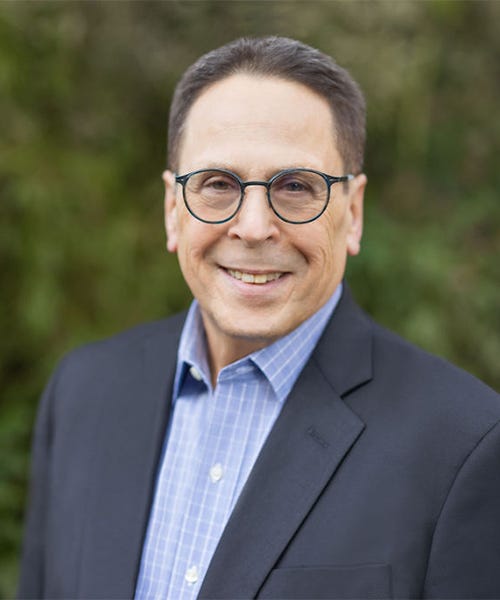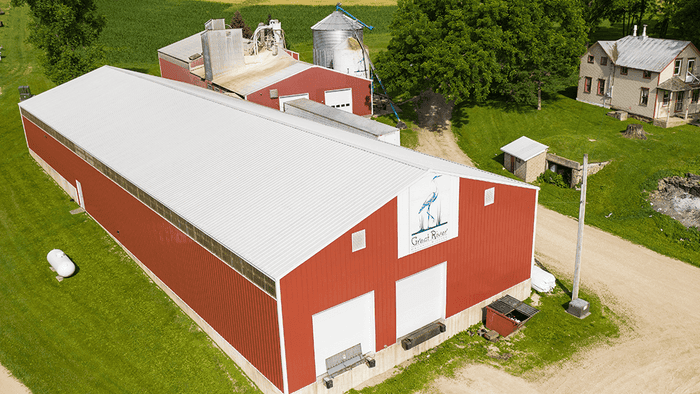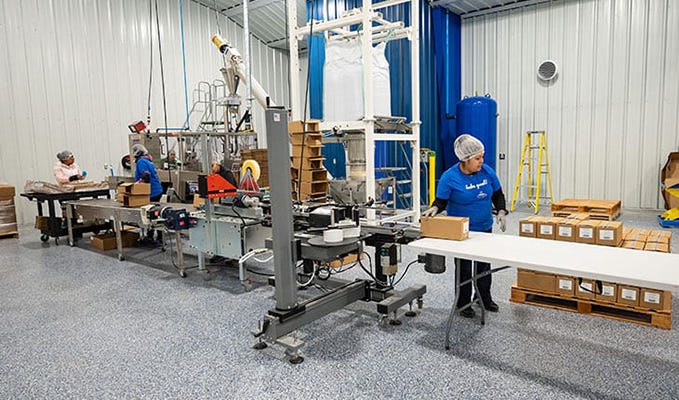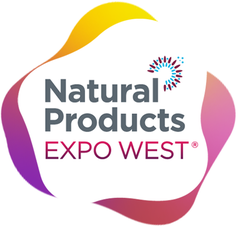Great River Milling to unveil Climate-Friendly Certified rice at Expo West
This legacy brand and co-packer will market the first product funded by USDA’s Partnerships for Climate-Smart Commodities program. Learn all about it.
March 6, 2024

If you’ve attended Natural Products Expo West in the last decade, then you’ve probably noticed Great River Milling’s booth. A perennial exhibitor, the Wisconsin-based stone-miller, co-packer and consumer-facing brand is well known for its premium organic flour, bean, pulse and rice products. While the company’s core ethics and commitment to sustainability haven’t budged, Great River has lots of exciting news to share at this year’s show.
In June 2023, the business was acquired by Enrich Foods, a newly created division of Columbia Grain International, one of the largest global suppliers and traders of bulk grain and pulses. Along with scaling up Great River’s current organic offerings, the company is pioneering regenerative farming systems that yield more sustainable food products at affordable prices.
Now the first fruits of these efforts, Great River Milling Climate-Friendly Certified rice, will debut at Expo West. Funded in part by the U.S. Department of Agriculture’s Partnerships for Climate-Smart Commodities program, these retail-ready products carry a much smaller carbon footprint than traditional rice—and they have hard data to prove it. Impressed, New Hope Network named Great River Milling Climate-Friendly Certified Long Grain White Rice a NEXTY Award finalist in the pantry–pasta, grains and rice category.
Natural products industry veteran Bill Germano, recruited to lead Enrich Foods as chief operating officer, discusses the new/old company’s mission and major sustainability strides.

Bill Germano, COO, Enrich Foods Credit: Kitta Bodmer Photography
To make sure we understand, can you please go over how Columbia Grain International, Enrich Foods and Great River Milling all fit together?
Bill Germano: We’re a new company named Enrich Foods and we own Great River Milling. Our parent company is Columbia Grain International, which has an 8,000-farmer network across the northern tier of the U.S., so we’re very seed to shelf. And because of our connection with farmers, we are really committed to improving sustainability, regenerative practices and ultimately the impact on nutrition. So we created a new subsidiary company, Enrich Foods, solely for the purpose of impacting not only the farmer but the whole supply chain, all the way up to the consumer.
The first thing we did was acquire Great River Milling, which has a legacy of top-notch stoneground and organic products. About half of the business is private-label organic products, including packing for some of the larger natural foods retailers. We’re not looking to reinvent Great River—we just want to provide the resources to do what they do on a much larger scale.
Is the original Great River Milling team still involved?
BG: Yes, everybody stayed intact, all the way up to the guy who has owned the company for the last 22 years, who started the organic business. He is general manager of the stone-milling facility and very involved. That was important. We didn’t want to mess up anything Great River was doing.
Great River Milling is a Natural Products Expo West NEXTY Awards finalist. Attend the awards ceremony at 6 p.m. PDT Thursday, March 14, in the Marquis Ballroom Center at the Marriott or watch it online.
What initiatives has Enrich Foods tackled since its formation?
BG: The most important one is what we are introducing at Expo West. It’s a project that has been going on for about a year. We partner with an agricultural technology company called AgriCapture, and together, we’ve worked on ways to improve the negative climate impact of growing rice.
The problem is that rice—the biggest consumption commodity of all grains—has traditionally been grown in flooded fields. That makes great rice, but the climate impact is significant. It requires huge water usage, has an unusually large discharge of greenhouse gases and depletes the soil. There is also large amount of inorganic arsenic inherent in any rice product, which comes from the water.
So, in simple terms, if we can change the growing process to essentially control the amount of water used, good things happen. From a climate standpoint, we cut water usage in half, really reduce greenhouse gas emissions and start to replenish the soil. We also reduce arsenic.
Wow, that’s awesome!
BG: Yes, but the real challenge—and one of our core initiatives—is making this scalable so that we can make a better rice product, but not at double the cost. So that’s the next part. We have to convert a lot of acres of rice fields so that this becomes large enough that ultimately, it’s approachable for consumers. And that’s hard to do because farmers live on the edge to start with. You can’t just ask them to change their practices.
Very true. How do you convince them?
BG: We’ve partnered with USDA [through] its Partnerships for Climate-Smart Commodities. USDA has contributed just under $10 million in subsidies to let us go to nearly 40 farmers in Arkansas and make this conversion. So now we have 50 million pounds of sustainably grown rice ready to take to market. This is the first of USDA’s Climate-Smart Commodities initiatives going to market. At the end of March, U.S. Secretary of Agriculture Tom Vilsack is coming to our facility to do a press event.

How does the Climate-Friendly certification fit in?
BG: Sustainability is important for everyone—manufacturers, retailers, consumers. But it’s almost a Wild West, where it’s easy to make a claim but hard to back it up, and there is no standard of identity. So, while we can reduce greenhouse gases, control water and all that, we also have to be able to back it up—and that’s what makes our work with USDA important.
Our partner AgriCapture puts equipment right in the fields to measure on a regular basis how much water is used, what gases are given up and things like that. So there are standards we have to hit before we can make the claim. Together, we’ve created an identity called Climate-Friendly Certified, which is an icon on our packaging, so that people can feel confident that this is the real deal. We are launching that on our Great River Milling brand at Expo West. We are also in conversations with a number of retailers about offering this product under their own private labels and using our certification icon.
Can brands not affiliated with retailers earn this certification too?
BG: With this [rice-growing] process and certification, we have the exclusivity of supply. So in the short term, any product that has this certification will come from us. But long-term, we don’t really care about that. If the whole industry shifts and rice is grown more sustainably in the future, then we are happy to be the catalysts. That is our ultimate intention.
Great River Milling–branded products are sold direct-to-consumer. Can retailers carry this brand too, or is private-label their only option?
BG: Up to this point, Great River’s business had been either private label or direct-to-consumer. But Climate-Friendly Certified Long Grain Brown and White Rice are meant for retail. We’re also launching a retail-specific line of organic flours and other products.
Interestingly, we’re also selling Climate-Friendly Certified rice as an ingredient for food companies. Think about baby food, for example. If a company can buy rice for its baby food that has half the inorganic arsenic, that’s a gamechanger.
Why did the company zero in on rice for Climate-Friendly certification?
BG: Because of the impact primarily. Number one, rice accelerates the negative impacts on the climate. According to a recent study, by 2030, 23% of agriculture’s contribution to climate change will come from conventional rice cultivation. Number two, we are very committed to the farmer. We want to accelerate regenerative practices because the American agriculture system, the way it works right now, is not helpful. We can only deplete the soil for so long. If we can come up with ways to regenerate the soil, that keeps the whole system healthy. The largest impact area we can do is rice, so we started with that.

Do you plan to develop more Climate-Friendly Certified grains?
BG: Absolutely. It’s early-stage, but we are exploring several commodity groups and looking at ways of reducing their impacts. We want sustainably grown chickpeas or lentils, for example, but neither of those would impact the climate as much as rice. I should add that Columbia Grain is creating a new position, director of sustainability and regenerative practices, because we want this stuff to flow throughout our farmer network.
What do you hope to accomplish at Expo West?
BG: As we developed the concept of the sustainably grown rice, it became obvious to us that this could be significant, so we want to use the opportunities at Expo to explain this. With most retailers and distributors, sustainability is core to their DNA, and many are going to Expo to find out how they can convert their product offerings to something more sustainable. So the need and interest are there. We just have to accelerate that messaging so that people understand what this is and why.
If Climate-Friendly Long Grain White Rice wins a NEXTY Award, what would it mean for your company?
BG: Oh man, you have no idea how excited we are to be part of this. Our biggest challenge is that everything we’re doing is still new. It’s funny, if you talk to the trade about sustainability, everyone [nods] their head yes. But if you ask what they are doing about it, they are still trying to figure that out. The recognition of a NEXTY Award would accelerate this not just for our benefit but also for the trade that wants to market it. I can’t think of a better way to legitimize what we’re doing. We’ve gotten this far, and we really appreciate that, and now we’d love to win.
What else should we know about your company?
BG: Just that this is from our heart. The formation of Enrich Foods is a real, sincere effort to put together a supplier model that can spread. The more we can make this scalable, the better off consumers will be. We want to shift the whole dynamic so that organic isn’t so expensive. It’s a lofty long-term goal, but we’re committed to it.

Great River Milling is exhibiting in Booth #4790, Hall D, at Natural Products Expo West. Click through for the agenda, registration, travel information and more.
About the Author(s)
You May Also Like




